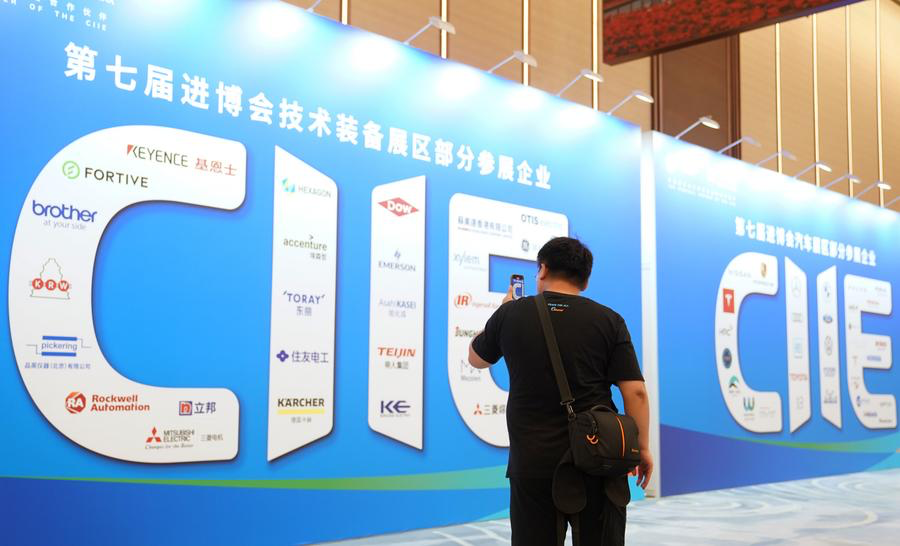Published: October 05,2024
Nation’s efforts present opportunities for global businesses, experts say
By CHENG YU

An attendee takes photos of a billboard during a pre-expo supply-demand matchmaking meeting for the Intelligent Industry & Information Technology Exhibition Area and Automobile Exhibition Area of the 7th China International Import Expo (CIIE) at the National Exhibition and Convention Center (Shanghai) in East China’s Shanghai, Aug 8, 2024. [Photo/Xinhua]
China’s intensified efforts to build resilient industrial and supply chains and expand international collaboration will further drive global industrial development and unlock a wealth of opportunities for companies worldwide, experts and company executives said.
The comments were made in response to the central authorities’ resolution to this end. The third plenary session of the 20th Central Committee of the Communist Party of China — a meeting key to the nation’s reforms and modernization progress — said the country will move faster to build industrial and supply chains that are self-supporting and risk-controllable.
Meanwhile, China will further deepen reform and opening-up, and facilitate international cooperation in industrial and supply chains, the meeting said.
“China is both a participant and beneficiary of global industrial and supply chains, as well as a firm defender and builder of these chains,” Zhang Qingwei, vice-chairman of the Standing Committee of the National People’s Congress, China’s top legislature, said during a recent meeting.
He added that the country will integrate more deeply with the global industrial and supply chain system and firmly oppose protectionism and any form of decoupling, while maintaining the desired outcome of global public good.
Zhang Yansheng, a researcher at the Chinese Academy of Macroeconomic Research, said that China has witnessed momentum in emerging sectors like new energy in recent years despite headwinds such as decoupling moves initiated by the United States and its relocation strategies.
“The US is leveraging new protectionism, industrial policies and government intervention to undermine the solid foundation of China’s industrial and supply chains. This retrogressive approach is not only unfair to Chinese companies and global consumers, but also a step backward in the global transition toward sustainability.
“What is to the benefit of all is that China will further deepen market-oriented reforms, expand high-standard opening-up, improve the legal system, and enhance the institutional framework for fair competition, green development and the advancement of clean energy domestically.”
Zhang added that if there were no negative spillovers of geopolitical tensions and protectionism, the supply and demand of new energy vehicles, photovoltaics and lithium batteries — areas in which the US unfairly accuses China of overcapacity — would achieve a dynamic balance at the global level.
Recalling that the US and China have both benefited tremendously from more bilateral trade, Neil Bush, chairman of the George H.W.Bush Foundation for US-China Relations, said while addressing a recent event that countries that rely solely on local manufacturing face significant challenges.
“Manufacturing is no longer confined to national borders. Countries that embrace innovation while working together can unlock new potential and drive economic growth by sharing research and best practices in technical advancements,” he said.
As Chinese companies continue to weave themselves into the fabric of global industrial and supply chains, Wang Yang, president of SinoEV (Hefei) Powertrain Technologies, a developer of electric vehicle power systems, said it is challenging for some countries to be independent of China’s new energy industry supply chain in the short term.
“Developing a robust supply chain requires a long time and certain favorable conditions, such as comprehensive policy and a large market scale,” Wang said.
“China’s new energy industry supply chain is competitive on the global stage, thanks to its complete industry chain covering research and development, engineering design, manufacturing management and final assembly integration. It will bring benefits to companies around the world.”
According to the Ministry of Industry and Information Technology, China is the only country in the world that has all industrial categories listed in the United Nations Industrial Classification, covering almost all traditional and emerging manufacturing sectors.
Zeng Yuqun, founder of Contemporary AmperexTechnology Co Ltd, a leading EV battery maker, said that countries can actually benefit from the new energy sector by sharing the industry chain.
“CATL has already taken some measures to diversify its overseas market and is willing to share its technology with the world,” he added.
Citing challenges faced by the global industrial and supply chains, Xue Lan, dean of Schwarzman College at Tsinghua University, said China will not isolate itself, but rather integrate more actively into the global innovation system to avoid severe disruptions in the global industrial chain.
“With its position in the global industrial chain key to the world, China must continue to innovate and open up to reinforce this position,” Xue said.
Chinadaily
 Africa -China Review Africa -China Cooperation and Transformation
Africa -China Review Africa -China Cooperation and Transformation
